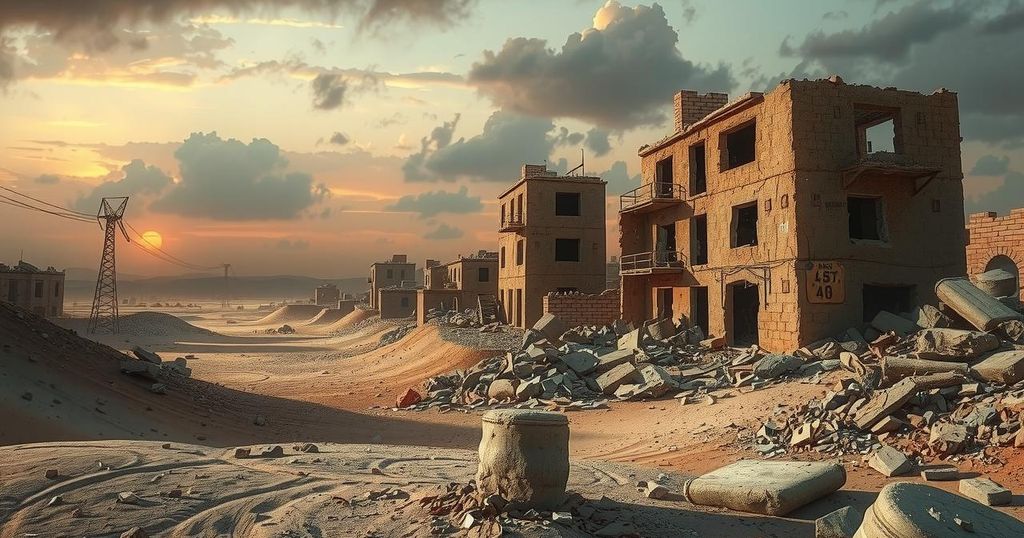Walid Jumblatt, a veteran Lebanese politician, discusses Israel’s regional tactics and their destabilizing impact on Arab nations amid growing tensions with Hezbollah. He emphasizes the importance of international aid for Lebanon’s reconstruction and advocates giving Syria’s new leadership a chance to foster stability. Jumblatt rejects normalization with Israel, advocating for a coherent Lebanese strategy of coexistence against ongoing conflicts, particularly following escalations triggered by recent conflicts in Gaza.
Walid Jumblatt, a prominent figure in Lebanese politics and the Druze community, has been extensively involved in Middle Eastern political dynamics. Although he stepped back as leader of the Progressive Socialist Party in 2023, Jumblatt’s voice remains influential, especially amid escalating tensions involving Israel, Syria, Iran, and the weakened state of Hezbollah. He warns that Israel’s tactics could significantly destabilize Arab nations.
In a recent interview with The National, Jumblatt highlighted the ongoing conflicts shaped by Israel’s aggressive posture in the region, stating, “Israel has a free hand. It’s up to the Arabs to understand the dangerous policy of Israel that is planning to dislocate the whole of the Arab world.” His experiences throughout Lebanon’s civil war and current developments position him as a critical observer of these geopolitical shifts.
Currently, Lebanon faces renewed challenges due to tensions between Israel and Hezbollah, especially after multiple Israeli attacks on Lebanese territory. Despite a ceasefire, the realities on the ground showcase continued Israeli military actions. Jumblatt describes the ceasefire as an “illusion,” asserting that it does not limit Israel’s military operations within Lebanon and asserting the need for robust international support to rebuild the war-torn areas.
Jumblatt has called attention to the severe repercussions of the conflict, with the World Bank estimating damages to Lebanon at $14 billion. He criticizes international donors linking aid to financial reforms in Lebanon, questioning the morality of connecting humanitarian assistance to governance reform.
Even as Hezbollah faces internal challenges with new leadership and increasing pressure from Israel, Jumblatt emphasizes the group’s integral role within Lebanese society. He acknowledges Hezbollah’s political importance and calls for a shift from violent resistance to more sustainable strategies for coexistence.
On the Syrian front, Jumblatt urges support for Syria’s new leadership under President Ahmad Al Sharaa, advocating for stability and unity in a nation that has been deeply divided. He states, “Give Ahmad Al Shara a chance. Because when you give Ahmad Al Shara a chance, you are giving a chance to the Syrian people.” Despite historical tensions with the Assad regime, he insists on creating opportunities for the new Syrian government while denouncing Israeli efforts to weaken Syria further.
In the context of Israeli-Syrian relations, Jumblatt firmly rejects normalization of relations with Israel, asserting that Lebanon must establish a firm stance regarding the state of armistice that governs interactions with Israel. His views were echoed against the harsh backdrop of the recent escalation initiated by Hamas, which disrupted an already fragile regional balance.
In summary, Walid Jumblatt’s perspectives highlight the intricate political landscape facing Lebanon and Syria while addressing the broader implications of Israeli military actions and their influence on Middle Eastern stability. Acknowledging the intertwined nature of these conflicts, he underscores the importance of both international support and Lebanese unity in facing these challenges effectively.
Walid Jumblatt’s insights reflect the complexities and challenges posed by the evolving geopolitical landscape in the Middle East, particularly regarding Israel’s actions and their impact on Lebanon and Syria. His commitment to preserving stability and advocating for humanitarian aid emphasizes a layered approach to conflict resolution and political advocacy, showcasing the necessity of internal and external cooperation. Through his engagement with the new Syrian leadership and acknowledgment of Hezbollah’s societal role, Jumblatt calls for a future grounded in inclusivity and reconstruction.
Original Source: www.thenationalnews.com






